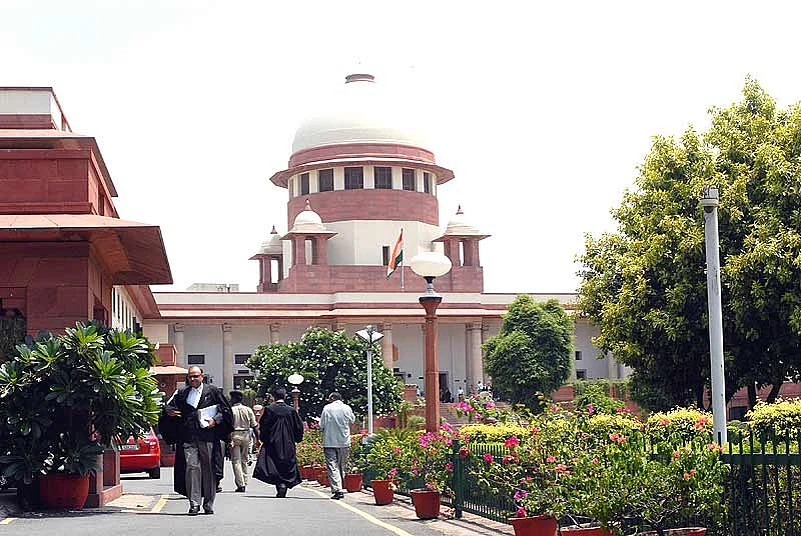| Foreign Firms: Pluses | And The Flip Side | |
|
| |
***
It’s a legal wrangle over legal practice. The Supreme Court interim order last week, on a petition filed by the Bar Council of India, on the contentious subject of allowing foreign law firms into the country, has rung in the final round of a battle that has raged for the past 18 years. The apex court adjudged that ‘practice of law’ involved both litigation and ‘desk work’ and instructed the Reserve Bank of India not to issue any clearance to any foreign law firm, laying the ground rules for a hearing later this year.
Spearheading the resistance to foreign law firms, the Society of Indian Law Firms (SILF) is scathing in its opinion. “Unlike our foreign counterparts, we are not into the business of law. We (sic) are a profession and our profession is not for sale,” reads one of its statements on the subject. SILF alleges that the government is under intense pressure from the US and the UK to open up the legal services sector. As elsewhere in the world, India does not allow foreigners to practice law.
But whether foreign lawyers can set up a practice on foreign and transactional law falls in a grey area, allowing foreign firms to operate by taking advantage of the ambiguity in the law with the government’s tacit approval. With an increasing number of Indian companies buying up land, mines and manufacturing units abroad, the demand for expert advice on foreign law and such acquisitions has gone up. The number of foreign law firms operating in the country, estimates SILF president Lalit Bhasin, has gone up from just three in 1994 to over 50 in 2012.
Indeed, the legal services sector has quadrupled in the last 20 years. There are over 200 Indian law firms now in major Indian cities, claims SILF. As many as 1.7 million advocates are enrolled with the Bar Council of India, and every year 60-70,000 law graduates are added to the ranks. Unofficial estimates place the turnover of Indian law firms at several thousand crores of rupees.
SILF, curiously, is not opposed to foreign lawyers flying in and out “on business”, but is against their setting up shop here. The reason is not far to seek. Foreign law firms now operate through Indian firms and end up paying substantial fees on the business secured. They have also tried out ‘best friend’ arrangements with Indian firms to share cost, training and infrastructure. Some foreign firms have also taken to recruiting Indian law graduates, mostly from the National Law Schools, at fancy salaries and having them trained abroad—all to circumvent the ban on foreign firms and lawyers.
The opposition also stems from the distinct possibility that foreign law firms, once allowed, might end up buying some of the Indian ones. Also, publisher-editor of the portal legallyindia.com, Kian Ganz, points out, “Entry of foreign firms might drive up top salaries in the market and prompt domestic players to increase their fees.” On the other hand, younger lawyers would also hope for better opportunities, and service conditions, and can be poached from Indian firms.
The issue has its genesis in 1994, when three firms, two based in New York and one in London, were allowed by the RBI to set up offices in India. Both the RBI and the Centre argued then that foreign firms were not interested in litigation but ‘desk work’, which, they believed, did not amount to legal practice. The Bombay High Court took almost 15 years to rule against the government in December 2009. But there was still no clarity on whether foreign lawyers could advise Indian clients here on foreign law, which the SC is now expected to adjudicate.
But the system was sought to be manipulated, points out Anand Grover of Lawyers Collective, which had first challenged the entry of foreign firms in 1995. Referring to a controversial ruling of the Madras High Court delivered earlier this year, Grover asks how two different high courts could lay down contradictory rules on the same subject.
The Madras High Court ruling took the “pragmatic” approach of allowing foreign lawyers to fly in and out of India for temporary periods. It would not be practical, the court said, to debar foreign lawyers in view of the government’s aim of converting India into an arbitration hub. “The Bombay High Court had already settled that foreign firms can’t practice here. There was no need for the Madras High Court to come up with a different ruling,” Grover told Outlook.
The eagerness of foreign law firms to get a foothold in India is evident. London-based A&O commissioned an “independent” survey this year to claim that Indian clients, lawyers, even law firms are overwhelmingly in favour of opening up the legal sector. When the British Prime Minister David Cameron visited India, his entourage included a high-profile British lawyer, Stewart Popham.
Ganz points out that the revenue of UK law firms are growing faster in Asia than in the West, which explains their eagerness to set up offices in India.
But Grover is clear that till the West allows Indian lawyers similar rights in their own countries, there is no reason to favour them here. “Nowhere in the world do they allow foreign lawyers to practise unless they are enrolled with the Bar and have cleared a tough examination,” he points out. Bhasin agrees. “There is even no point in the UK allowing Indian firms permission to open offices, unless work permits are also given,” he says. Reciprocity is a concern, adds Bar Council of India chairman Manan Kumar Mishra. “We recognise law degrees conferred by 25 foreign law schools in India; but the West does not recognise ours.”
Indian firms also complain that while foreign law firms are allowed to advertise, Indian law does not permit any kind of advertising or soliciting by lawyers. The websites of law firms, contends Bhasin, contain the barest minimum information, and that too thanks to a special directive of the apex court.
The Bar Council of India is also opposing moves to allow Harvard, Yale and Stanford law schools to set up campus in India, which it feels would lead to a “backdoor entry” by foreign lawyers.
Experts, however, feel that second generation reforms in legal education, preparation for a level playing field and putting proper guidelines in place would sort out the matter. “It will be far less painful then, when the invasion does take place,” says a former chairman of the Bar Council of India.


























